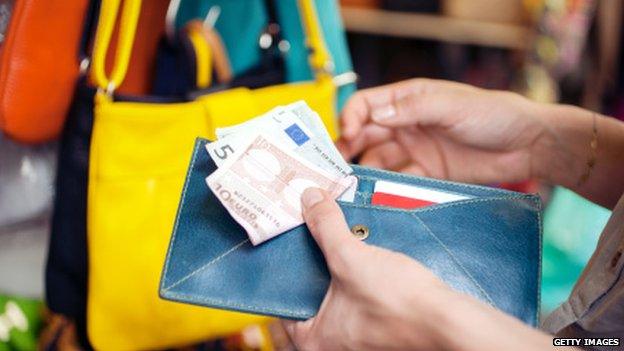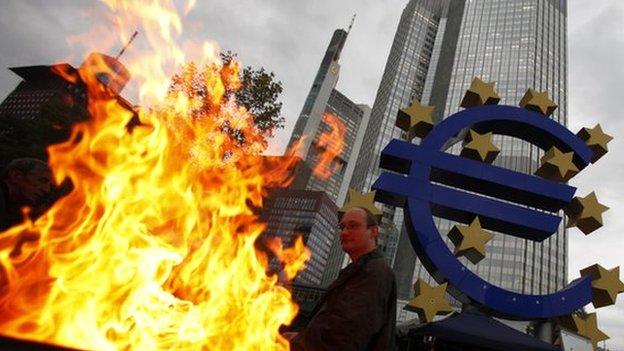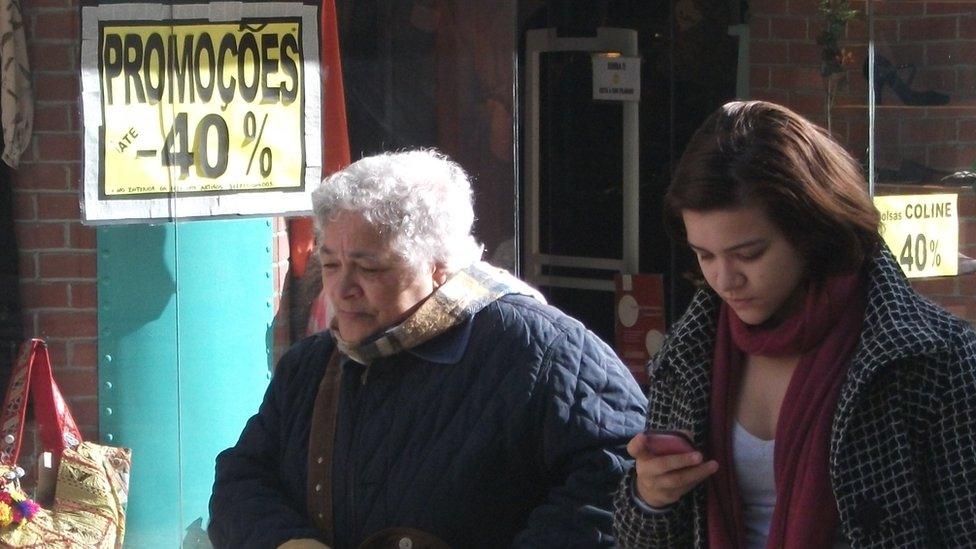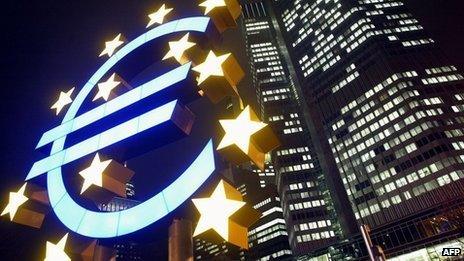Eurozone inflation slips further into the 'danger zone'
- Published

Eurozone inflation has fallen to its lowest level since the height of the financial crisis, sliding further into what the European Central Bank (ECB) has described as a "danger zone".
Prices rose in the single currency area by 0.4% in July, from 0.5% in June.
The ECB considers that an inflation rate of below 1% poses a risk of deflation.
Separate figures show that unemployment in the region fell slightly to 11.5% in June compared to 11.6% in May.
The new inflation figures from the European Union's statistical office, Eurostat, show that the rate remains persistently below the ECB's target rate of 2%. Prices have risen at an annualised rate of less than 1% for the last ten months.
Central Bank governor, Mario Draghi, has previously warned that he would deem inflation below 1% to be in a "danger zone", which could lead to prices tipping into a deflationary spiral.

Analysis: BBC economics correspondent, Andrew Walker
Deflation - falling prices or below zero inflation - in the eurozone has come a step closer.
Several individual countries have already had at least a brush with it. Spain's new figures show a fall in prices over the previous twelve months. Greece and Portugal already had inflation below zero.
It can be a serious problem - not inevitably; it depends on the circumstances. But it is clear that the European Central Bank is very keen to avoid deflation.
The new figures increase the chance that the ECB will embark on a full scale programme of quantitative easing (QE), buying financial assets such as government debt with newly created money in an effort to push inflation up (yes really).
It's a sign of how weak the eurozone economy is that this debate is underway just as the US Federal Reserve seems close to ending its own QE programme.

In June the ECB introduced a package of measures to boost growth and tackle the threat of inflation.
It cut interest rates, including reducing the bank deposit rate to below zero, and made available cheap long term loans to banks. It promised to stand ready to take more action if inflation continued to fall.
Lower still
Brian Tora, from the investment managers J.M. Finn and Co said it was hard to see what more the ECB could do if inflation fails to respond to the measures already taken.
"They could instigate a programme of asset purchases. But it's more complicated for the ECB than for a central bank that's just responsible for one nation state."
The ECB has not undertaken large-scale asset purchases in the same way as the UK and US central banks.
"But it's worth remembering that [Mr] Draghi said last autumn it would do whatever it took to keep Europe out of recession," said Mr. Tora.
Analysts also point to a fall in energy prices as contributing to lower inflation.
"There is undeniably a very real risk that eurozone consumer price inflation could go lower still ... barring an appreciable rise in oil and gas prices resulting from geopolitical factors hitting supplies,'' said Howard Archer, economist at analysis group IHS.
Core inflation which excludes food and fuel costs was unchanged for July at 0.8%.
More jobs
The eurozone jobs data provided a gentle pointer in the opposite direction, however, towards stronger growth.
The number of registered unemployed in the eurozone stood at 18.41 million in June, down 152,000 from May.
The unemployment rate in the 18-nation single currency region June dipped to 11.5% compared to 12% a year ago.
In the wider 28-member European Union the jobless rate also edged lower from 10.3% in May to 10.2% in June.
Austria's unemployment rate is the lowest in the region at 5%, followed by Germany at 5.1%.
However, Greece, with an unemployment rate of 27.3% and Spain, at 24.5%, are still grappling with severe levels of joblessness.
Jonathan Loynes at Capital Economics said: "There is still a lot of spare capacity in the labour market, adding to the downward pressure on wages and prices."
- Published5 June 2014

- Published29 January 2016

- Published3 July 2014
